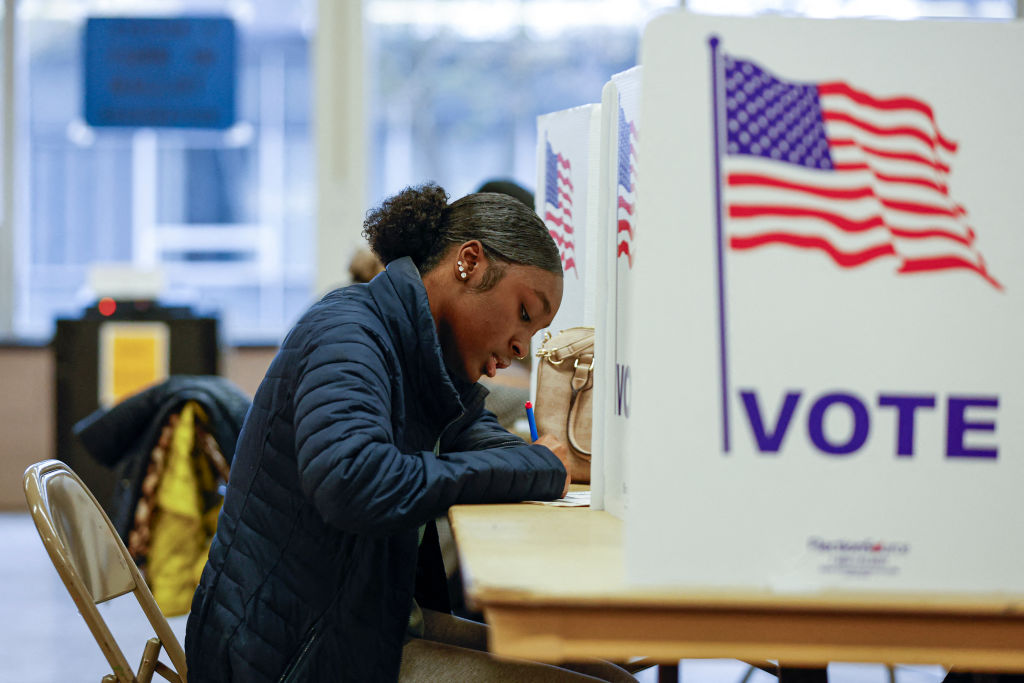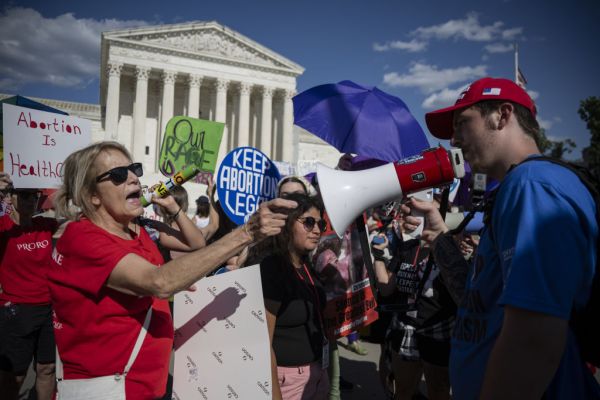Happy Tuesday! Today is—at long last—the day. And if you had enough of the cable news election graphics sometime in early 2023, then we have the election night destination for you: Join us instead for a special, three-hour election night livestream! Usually, Dispatch Live is exclusively for Dispatch members—but we’re making this special episode available to all our readers, so feel free to invite your friends and family!
We’ve put together a stacked lineup for the night—including Megan McArdle, Stephanie Slade, David Frum, and Sharon McMahon. They’ll join your favorite Dispatchers to track the state-by-state updates, break down the results, and keep calm through the uncertainty. See you tonight at 10 p.m. ET!
Quick Hits: Today’s Top Stories
- Vice President Kamala Harris wrapped up her campaign in Pennsylvania on Monday, making stops in Scranton, Allentown, and Reading—where she did some door-knocking—before concluding with a star-studded rally in Philadelphia. Meanwhile, former President Donald Trump made stops in North Carolina, Pennsylvania, and Grand Rapids, Michigan, where he hosted his final rally of the cycle—as he did in both 2016 and 2020. Harris will spend election night at her alma mater, Howard University, in Washington, D.C., while Trump will hold an event in West Palm Beach, Florida.
- The New York Times tech union—which represents some 600 software engineers, data analysts, and other employees who work on the back end of the Times’ website and apps and on the business side of the newspaper—went on strike on Monday, just one day before the election. The Tech Guild, in negotiating its first contract since 2022, has made a number of demands that include “just cause” termination agreements, pay raises, a four-day work week, and a more comprehensive health care package, among other more specific, and perhaps even illegal, proposals.
- The Supreme Court on Monday agreed to hear a case about Louisiana’s disputed congressional district maps, though the decision will come after the current election cycle. Following the 2020 census, which showed that one-third of Louisiana’s population is black, the Republican-controlled state Legislature redrew the congressional maps but included just one majority-black district of six districts. Federal courts ruled the maps likely violated the Voting Rights Act, and the Legislature in January redrew them to include a second majority-black district, though the new map is now being challenged by a group of Louisiana voters who argue it amounts to a racial gerrymander. In May, the court ruled in favor of using the current districts for this year’s election.
- Pro-Western Moldovan President Maia Sandu on Sunday won a second term in the second round of a presidential runoff. Sandu won 55 percent of the vote, beating Alexandr Stoianoglo, who has advocated for a closer relationship with Russia. The election followed votes last month in the first round of the presidential election and on a referendum to enshrine Moldova’s intention to join the European Union, which passed by a slim margin. All three elections were plagued by concerns over Russian interference and vote-buying.
- Israeli Foreign Minister Israel Katz formally notified the United Nations on Monday that Israel was withdrawing its recognition of the United Nations Relief and Works Agency for Palestine Refugees (UNRWA)—which has previously been linked to Hamas in Gaza—after the Israeli Knesset passed legislation forbidding the agency from operating in Israel and Israeli government officials from coordinating with it. Israeli officials told the U.N. that it would continue working with other international agencies and other U.N. agencies to provide aid to Gaza, and it’s not clear what the actual operational impact will be for UNRWA in the short term.
- The Wall Street Journal reported on Monday that Western officials suspect Russia was responsible for planting two incendiary devices on cargo planes bound for the U.S. and Canada. The devices were reportedly shipped via DHL cargo planes and ignited at DHL hubs in Leipzig, Germany, and Birmingham, England. European authorities have arrested several suspects they say are part of a larger Russian plot to target cargo and passenger aircraft. The two devices—plus at least two others—were an effort to test how to get them onto planes bound for North America, they said.
- A U.S. soldier who was critically injured earlier this year while working to construct the temporary aid pier in Gaza died on October 31, Army officials said Monday. Sgt. Quandarius Davon Stanley, 23, had been medically retired from his unit due to the injuries he sustained this summer, which the Pentagon said were not combat-related. He was one of three soldiers injured constructing the $230 million pier, which was only functional for less than a month. The other two soldiers suffered only minor injuries.
- Boeing machinists voted on Monday to approve a new contract, ending a two-month strike on the West Coast. Union members approved the new contract—which would give them a 38 percent hike over four years, plus a $12,000 ratification bonus—with 59 percent voting in favor. The strikers had previously rejected two proposals from Boeing.
What to Expect When You’re Expecting A Close Election

Happy (or whatever emotion you prefer) Election Day from the crew at TMD! All the analysis, projections, and predictions are now mostly done—all that’s left is to do is vote, and then, crucially, count.
As you’ve probably heard ad nauseam at this point, it’s possible and even likely that we will not know who won the presidential election by the time most sane people are in bed tonight. But there’s lots we can and will know—about when voting finishes, about how and when states count votes, and what happens if the margins are tight—by Wednesday morning that could give us a sense of where this thing is headed and what might happen next, for those of you not breathing into a paper bag or rooting for SMOD.
Seven states will likely decide the next occupant of the White House: Pennsylvania, Michigan, Wisconsin, North Carolina, Georgia, Arizona, and Nevada. So when in the night will we hear from our first voters in those states? Georgia—which took its sweet time counting in 2020—will be the first of the swing states to close its polls, at 7 p.m. ET. Because counties there are allowed to start counting early and mail-in votes on Election Day, there will probably be large, and likely blue-leaning tranches of votes ready to report shortly after polls close—likewise in North Carolina, whose polls close at 7:30.
By 8 p.m., we’ll have some early indications from the first hour of returns as to how each candidate may be faring: As our own election guru, Chris Stirewalt, explained in his newsletter over the weekend, rural Nash County, North Carolina, for example, could be a barometer for Harris’ performance with rural black voters. Later that hour, we’ll see the first results from Michigan and Pennsylvania—though don’t expect to know which way the Keystone State is headed for a while. By around 8:30 p.m., North Carolina and Georgia should start reporting vote tallies, including from the crucial Atlanta exurbs.
At 9 p.m., results from the West start seriously rolling in, with North Carolina and Georgia likely above 50 percent reporting. If Harris is outrunning the polls in those states at this point, Chris explained, she will be in an excellent position, but “if Trump looks on track to win both, buckle up for a long night as we wait for the blue wall to report,” he wrote, using politico speak for Pennsylvania, Michigan, and Wisconsin.
At 10 p.m., Arizona and Wisconsin will start reporting their first results. Shortly after, polls in Nevada will close—though we won’t have results from that state for several hours—and Arizona will report mail-in ballots which will be roughly half of the total vote.
As we inch toward midnight on the East Coast, Chris offered a good guide for how to make the decision as to whether or not to head to bed: “If Harris has pulled an Obama and is going to put the race away, this is a prime time to see some consequential calls.” But for night owls, Allegheny County in Pennsylvania (Pittsburgh) and Wayne County (Detroit) expect to finish counting by midnight.
Harris campaign officials, for their part, said Monday that they expect to see near-complete results from Georgia, North Carolina, and Michigan by the end of election night. Updates will continue through Wednesday from the slow-counting states of Nevada, Arizona, and Pennsylvania.
That’s the next 24-ish hours in a nutshell. But how will the votes actually be counted? And how does this affect the speed of the count? On Election Day, all but one of the seven swing states will use a mix of electronic and paper voting, with Georgia voters relying exclusively on ballot-marking devices (BMDs): machines that allow voters to make their choices on a touchscreen, which is then turned into a printed ballot. These machines will speed up the ballot-counting process.
Many swing states will also get a head start on vote counting. Michigan, North Carolina, Pennsylvania, and Wisconsin all allow the counting of absentee ballots to begin before polls close on Election Day, while Arizona and Nevada allowed it to begin before the day started. And all but Pennsylvania and Wisconsin allowed processing—verifying the voter signature, opening the envelope, and stacking it with other ballots to prepare for tabulation—to begin before Election Day, as well.
Unfortunately for those of us who just want to know who won, the latter two states have a good chance at being the “tipping point state,” meaning that there is a chance that the Keystone and Badger states’ idiosyncratic rules make an extended wait for results more likely.
Of course, that is all assuming the winner will be decided by the initial vote count, which—shudder—may not be the case. According to FiveThirtyEight’s forecasted margins of victory in each state, Nevada and Pennsylvania are both projected to be within 0.5 percentage points after all the votes are counted. And it is possible, although admittedly unlikely, that each other swing state is similarly close: Wisconsin, Michigan, North Carolina, and Georgia are all projected to have margins of just over 1 percent, while Arizona sits at 2.2 percent. A modest polling error could bring all of them into 0.5 percent territory.
Why the fixation on that number? Because—as The Dispatch staff explain in a swing state primer on the site today—in Arizona and Pennsylvania, a victory within that margin triggers an automatic recount. Additionally, in Pennsylvania, any three voters can request a recount in a specific precinct if they allege fraud or error. In North Carolina and Georgia, candidates can request recounts if the margin is within 0.5 points as well. In Wisconsin, candidates can request a recount but have to foot the bill if the margin is above 0.25 percentage points, which Trump agreed to do in 2020. That recount resulted in essentially no change in the ultimate vote total. In Nevada, candidates can request a recount for any reason but have to pay for it. And in Michigan, automatic recounts are only triggered if the results are within the infinitesimal margin of 2,000 votes—far smaller than Joe Biden’s 150,000 vote margin in 2020; any candidate may also request a recount if they can allege suspicion of fraud or mistakes.
How long do recounts usually take? In 2020, Wisconsin’s one-county recount took just more than a week. Georgia’s statewide hand recount in 2020, requested by the Trump campaign, took a week as well. But it is conceivable that statewide recounts in any of the seven swing states could take longer. A 2020 hand recount of just 59,000 votes in Lycoming County, Pennsylvania, for example, took three days.
What we do know is that, as we’ve previously reported, Trump is almost certain to challenge close votes he loses, wherever they occur. Over the next several days—and potentially weeks—prepare for an election that might be called sooner than expected, but argued over for far longer.
One couple in Reading, Pennsylvania, got a surprise visitor at their doorstep Monday evening: Vice President Kamala Harris. The Democratic nominee spent part of her campaign’s waning hours knocking on doors in likely the most important swing state of the election. Today’s vote will prove whether Harris’ effort reflected a campaign leaving it all out on the field in a victorious bid or the final scrambling of a failed candidacy.
Harris and former President Donald Trump closed the book on their respective campaigns yesterday with a flurry of stops in Pennsylvania, North Carolina, and Michigan, concluding a frenzied race after Joe Biden’s exit in July. But the chaos ultimately gave way to remarkable stability in the polls, which are now as tight as they’ve ever been.
With nothing left to do but wait for returns to come in, most election data wonks have resigned themselves to the fact that the race is just that close. “Nationwide or across the key battlegrounds collectively, neither Kamala Harris nor Donald J. Trump leads by more than a single percentage point,” the New York Times’ Nate Cohn noted Monday.
The margins on both individual and national survey averages have become so narrow that analysts have begun discussing the risk of poll herding: the potential bias against being the odd poll out, which could be drawing forecasters’ toplines together. Our own Chris Stirewalt’s final national average put the race at 48.4 percent for Harris to 47.4 percent for Trump.
But the narrow—in some cases tied—polls don’t preclude a potentially decisive Electoral College victory. In fact, such tight margins could make for an unexpected outcome. If the polls end up being off even slightly but in the same direction, then there could be a swing state sweep—we just don’t know which candidate would be doing the sweeping. Even that is still a polling win, as far as accuracy goes—within a couple of points is nothing to sneeze at—but the polls could also be closer to dead on, setting us up for a nailbiter à la the 2000 election.
Both campaigns tried to squeeze whatever juice was left out of their battleground efforts on Monday. The Harris campaign finished on a Pennsylvania blitz, starting the day with a stop in Biden country, Scranton, where she hyped campaign canvassers. She followed that up with visits to Allentown and Reading—both cities with large Hispanic populations—as well as a stop in Pittsburgh before her final rally in the City of Brotherly Love.
It was a star-studded affair, complete with performances from Ricky Martin and Bon Jovi. Lady Gaga sang “God Bless America,” and Oprah introduced Harris. “Here at these famous steps, a tribute to those who start as the underdog and climb to victory,” the vice president said at the foot in front of the Philadelphia Museum of Art (aka the Rocky Steps). “The momentum is on our side.”
As we noted last week, the closing leg of the Harris campaign featured a partial reversion to the gloomier rhetoric of the Biden campaign that leaned into the consequences of a Trump victory for democracy. But in the final days of barnstorming Harris returned to the joyful, happy warrior messaging that characterized her entry into the race. She didn’t mention Trump by name in her rally in East Lansing, Michigan, on Sunday.
She continued the same positive message last night in Philadelphia. “Our campaign has tapped into the ambitions, and the aspirations, and the dreams of the American people because we are optimistic and excited about what we can do together,” she told her supporters. “Tonight, then, we finish as we started: with optimism, with energy, with joy.”
But her speech still included some clear allusions to the former president. “We have an opportunity in this election to finally turn the page on a decade of politics driven by fear and division,” she said. “We are ready for a president who knows that the true measure of a leader is not based on who you beat down but based on who you lift up.”
Trump capped his campaign Monday with stops in Raleigh, North Carolina, Reading, Pittsburgh, and, lastly, Grand Rapids, Michigan. The former president had a busier schedule in the final weekend of stumping than he has had for much of the campaign, which included a series of his common off-the-teleprompter remarks that veered into the ominous and threatening.
“They’re fighting so hard to steal this thing,” Trump said at a rally near Lancaster, Pennsylvania, on Sunday, continuing his efforts to claim upcoming election results will be fraudulent. When discussing the border, he said that he regretted actually leaving office in 2020. “I shouldn’t have left, I mean honestly, we did so well,” he said.
In what has become a feature of his campaign, he included a violent remark in a joke about the placement of protective glass panels on his stage. “To get me, somebody would have to shoot through the fake news,” he said, gesturing to the press area. “I don’t mind that so much.”
But the former president also delivered some bizarre—even for him—remarks in perhaps a sign of the intense schedule weighing on the 78-year-old. As the former president has become increasingly freewheeling in his rally speeches, he’s repeatedly outlined his “weave” method of speechifying—but Sunday’s rally was possibly the most unhinged explanation of it yet. “I’m a very smart person, you know they’ve refused it, now they’re seeing, ‘that was the most brilliant speech,’” he said as he described his method.
“They’re saying it’s a weave, you go, and then you’re here,” he added while signaling a wavy line in the air with his hands. “And then you’re here. And then what happens is while you’re here, there’s a point having to do with that point and you go wing, wing. Then you come here, then you do another weave, hee, hee, hee. It’s very complex but then it gets very simple because it all comes brilliantly and beautifully together.”
At the Sunday rally in Pennsylvania, he explained that he looked bad on television because of the protective glass panels. He also returned to his fascination with genetics. “I’m a pretty smart guy,” he told the crowd. “I have genetic—Do you believe in genetics? I do, you know. Fast race horses produce fast race horses whether you like it or not, and, uh, but I’m uh I’m a very, uh, I, I believe in it.”
Public policy snuck its way into the Trump campaign’s closing arguments, with Robert F. Kennedy Jr. making his case for a health-focused position in a Trump White House. At a rally in Macon, Georgia, on Sunday, Trump outlined a series of responsibilities RFK would have, including for health, food, and pesticides. “I want to be in the White House and he’s assured me that I’m going to have that,” RFK said over the weekend. “I’m confident that if I wanted to be [Health and Human Services] secretary, the president would fight like hell to make that happen.”
The campaign also seems to have adopted RFK’s thoroughly discredited anti-vaccine views—particularly Howard Lutnick, the head of the Trump transition team, and Trump’s running mate, Sen. J.D. Vance of Ohio, who discussed his vaccine skepticism with Joe Rogan on his podcast last week. Trump has also not ruled out banning some vaccines, and RFK has talked about forcing water utilities to stop adding fluoride to their drinking water despite Centers for Disease Control findings about its value and safety. When asked about the plan Sunday, Trump said, “Well, I haven’t talked to him about it yet, but it sounds OK to me.”
While Harris delivered her final remarks of the campaign in Philadelphia, the former president’s stage in Grand Rapids—the city where he ended both his 2016 and 2020 campaigns—stood empty for well over an hour Monday night as Trump was late. When he arrived, he toed the line between telling his supporters that victory was already in the bag and making sure they actually go out and vote today, leaning on a bit of social shaming.
“If we get out our people, it’s over, there’s nothing they can do about it,” he said. “In other words, to make you feel a little guilty, we would only have you to blame.”
Worth Your Time
- As we prepare ourselves for whatever comes next, it’s worth remembering that for millions of people around the world, this country is still the gold standard. “As the 2024 presidential election nears its close, rhetoric is flying. Some describe America and Americans as ‘garbage,’ ‘dipshits,’ ‘weird,’ and even suggest that some people need to be ‘shot,’ Others claim that, in a matter of months, America will no longer resemble the country we know today,” James Pindell reported from a naturalization ceremony for the Boston Globe. “Francine Mukungilwa can’t wait to be part of it. With a broad smile, Mukungilwa feverishly waved a small American flag jumping out of her seat during a rendition of ‘America the Beautiful’ at an official naturalization ceremony last week in Methuen. She is now one of America’s newest citizens, joining a nation of immigrants. ‘I love America. America welcomed me with grace and opportunities I couldn’t find anywhere else,’ said Mukungilwa, a day care provider who lives in Lowell with her eight children. … Melvin Wleh, 34, of Dracut by way of Liberia, offered the same reason after 13 years in the country. ‘I consider myself an American, but now I get to do the most American thing, which is to vote,’ he said.”
Presented Without Comment
The Verge: Elon Musk’s PAC Admits $1 Million Voter Giveaways Aren’t ‘Random’
Also Presented Without Comment
CNN: Joe Rogan Endorses Trump on Eve of the Election
Also Also Presented Without Comment
Philadelphia District Attorney Larry Krasner warns against intimidating voters on Election Day:
Anybody who thinks it’s time to play militia: F around and find out. Anybody who thinks it’s time to insult, to deride, to mistreat, to threaten people: F around and find out.
In the Zeitgeist
It’s been a big year for women’s sports, from Caitlin Clark’s dominant final season with the Iowa Hawkeyes and record-breaking season in the WNBA to U.S. women performing so well at the Olympics that if they were a country unto themselves, they would have come in third in the overall medal count.
With more energy than ever behind women’s leagues, there’s a new one in town: Last week, Justine Siegal, the first woman to coach in Major League Baseball, announced the formation of the Women’s Pro Baseball League, coming in 2026. Women, it might be said, might once again have a league of their own.
Toeing the Company Line
- In the newsletters: Kevin argued (🔒) the abortion issue isn’t going away after the election, the Dispatch Politics crew covered Harris’ college tour ahead of Election Day, and Nick argued America is getting what it deserves.
- On the podcasts: Sarah and David check in on the very American cases the court will hear this term on Advisory Opinions.
- On the site: Steve reports on how the legacy of January 6 may come to matter in this election, Stirewalt reflects on why polling is different than voting and why polls always get the outcome at least a little bit wrong, and several Dispatch staff members offer a primer with everything you need to know about election procedures in the swing states.
Let Us Know
So we have to ask: Who do you think will win?











Please note that we at The Dispatch hold ourselves, our work, and our commenters to a higher standard than other places on the internet. We welcome comments that foster genuine debate or discussion—including comments critical of us or our work—but responses that include ad hominem attacks on fellow Dispatch members or are intended to stoke fear and anger may be moderated.
With your membership, you only have the ability to comment on The Morning Dispatch articles. Consider upgrading to join the conversation everywhere.